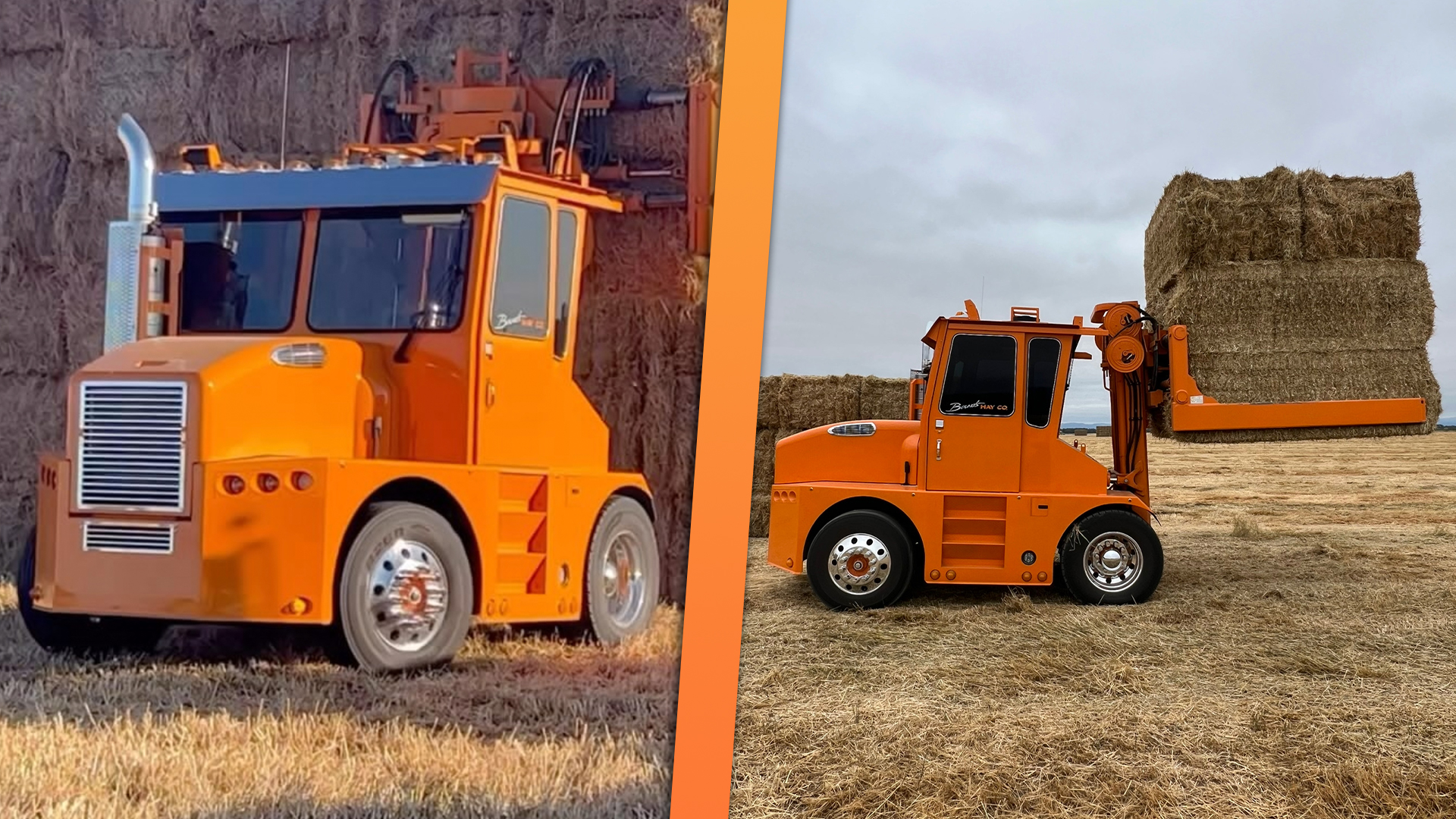

It’s my job to find the coolest automotive-adjacent stories out there and write them for you, the people. In this case, though, the highway-legal forklift found me. It popped up on my Instagram feed, looking like a small-scale semi-truck loading hay onto a full-scale semi-truck’s trailer. I went on a hunt from there to find out more because, well, I think it’s pretty obvious: This might be the handiest dual-purpose work rig ever.
The vehicle is officially called the Oregon Roadrunner Hay Squeeze, and it’s sold by Sunny “D” Manufacturing in Klamath Falls, Oregon. The first one was built a little more than 50 years ago and some 700+ units have been hand-assembled since then. The Roadrunner has evolved over time with modern looks, EPA-compliant diesel powertrains—which might be the most impressive part of it all—and oh yeah, they’re capable of cruising along at highway speeds.
Older models were available with pre-emissions Cummins and Detroit Diesel engines. Now these bad boys come standard with an 8.9-liter Cummins L9 making 330 horsepower. If that’s not enough, you can option them with a 370-hp lump that packs a little more pep. Both are paired with an Allison 3000 RDS transmission, which is a close-ratio six-speed automatic used elsewhere in fire trucks and agricultural spreaders. This enables operators to move the machines quickly from one property to the next without a trailer, boosting productivity through the roof as they move more bales at a time while on-site.





They’ve made a believer of Jesse Bounds, who owns Bounds Hay Co. in Junction City, Oregon. He’s a hay exporter that moves cattle forage across the country and even to markets like Japan and the Middle East. His small fleet of Hay Squeezes is painted bright orange to match his big rigs that haul the bales on the road, and it was his Instagram that turned me onto the Roadrunners in the first place.
“I couldn’t imagine doing this without these machines. We couldn’t,” Bounds told me over the phone. “Our operation would be such a disaster.”
“If we didn’t have them, we’d have to be moving a normal forklift-style squeeze from field to field and they’re very slow,” Bounds continued, adding that his Roadrunners can hit 75 miles per hour on the highway. “Yesterday, for example, we left out of my place and drove an hour and a half to a field. We loaded four semi loads. Drove 20 minutes to another field and loaded 10 more. Drove a mile to another field and loaded four more. Then, when the operator’s done, he just drives home.”
Indeed, the Hay Squeeze’s main purpose is loading and unloading bales as quickly as possible. They’re capable of moving 8×8 stacks and lifting as high as 20 feet, which means that trucks can leave the barn in a hurry. This is what owners are after, ultimately, as these are tools at their core meant to scale with operations that have long surpassed bucking hay by hand.
Of course, they’re pretty enticing with all the amenities that come standard. Air conditioning, power steering, and AM/FM radios with cassette decks are built into every Roadrunner. If you feel like spending a little extra, you can even get dual AC units, tinted windows, and an onboard electronic scale. Bounds compared the ride of his nicest Hay Squeeze to a brand new Ford pickup.


And because the Roadrunners share so many parts with medium-duty trucks, serviceability is a breeze compared to other machines. Rather than having to track down proprietary parts, owners can find a rear end out of a box truck, for example, and get back to work pronto. Thanks to this and they’re on-road versatility, downtime is drastically reduced.
They’re just so darn handy. New ones command an asking price of roughly $250,000 and people pay it because they get that much more work done. Bounds tells me that values have skyrocketed on used examples as well, with ’90s machines jumping some $30,000 from their previous price point to roughly $100,000.



Not many hobbyists are buying a Hay Squeeze, but that was never the target audience. These are built to work hard for folks who need them to do exactly that. They’re an innovative solution to a problem not many people outside the hay business really consider, and for that, they’re loved by those who run ’em.
Got a tip or question for the author? Contact them directly: caleb@thedrive.com